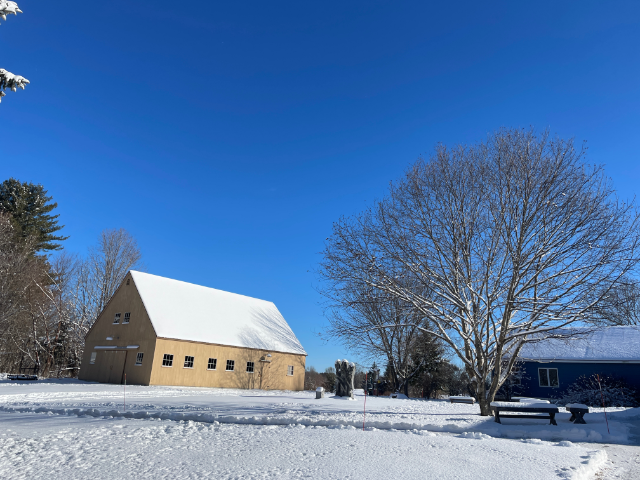There is no better way to beat cabin fever than digging out your skis, snowshoes or hiking cleats. As we finally begin to see snow accumulation here in Maine, more people will be seeking opportunities and recreate outdoors. Even on one of the many mild winter days we have experienced this winter when the sun is shining and temperatures hover around 40 degrees, it is important to take safety seriously and be prepared for you activity.
While those of you familiar with the Arboretum may not think that there is much risk associated with a hike on the trails, winter elements such as rapidly changing temperatures and weather conditions, ice and snow do create additional risk. While most mishaps for the unprepared at our facility are more likely to experience an uncomfortable situation rather than a life threatening one, there are some simple ways to improve the outcome of an unexpected situation ahead of time.
Love your Layers: Appropriately layering your clothing will help you be more comfortable during your hike by regulating your temperature and wicking moisture away from your body. We recommend a high quality base- layer, a mid-layer and a water and wind resistant outer-layer. During periods of activity where your body warms up, you can remove your outer layers. Having these outer layers accessible for when you stop moving or in the event weather changes is critical though, as you can become chilled rapidly when you slow down or stop. Hats, gloves and face coverings are also important to have on hand to protect your skin from the cold.
layer, a mid-layer and a water and wind resistant outer-layer. During periods of activity where your body warms up, you can remove your outer layers. Having these outer layers accessible for when you stop moving or in the event weather changes is critical though, as you can become chilled rapidly when you slow down or stop. Hats, gloves and face coverings are also important to have on hand to protect your skin from the cold.
Say no to Cotton: While cotton may provide you with an affordable fabric to diversify your wardrobe with it is not a safe or effective material for outdoor recreation. Cotton has a nasty tendency to become cold when wet, sapping heat from your body. Better alternative include synthetics such as polyester or wool.
Hydrate: It might be easier to forget your water for a winter hike than in the summer heat, but remaining hydrated is just as important during the cold months. Snow and ice are not reliable water sources in a pinch unless you have the means to melt it. Be sure to bring enough water for your entire trip.
Bring a Snack: Your body needs to burn a lot of fuel in cold weather to keep you warm. Bring enough food to keep yourself satisfied during the duration of your hike.
Let Someone Know: Always be sure to let a trusted individual know your plans; where you will be going and what time you expect to return. In the event that you become disoriented or unable to walk back to the trailhead, someone will have a rough idea of where to begin looking for you. Keeping others informed is perhaps the single most important thing you can do to be found in the event of an emergency. While cell phones have come a long way to be able to have service in remote locations, they are not entirely reliable. The batteries of our electronics are especially susceptible to draining faster in cold weather.
While every activity comes with risk, taking a few simple steps to mitigate the risks associated with winter recreation is worth the time to improve your comfort during your adventure and help ensure you return home safely. If you are new to winter recreation, start slow and manage your expectations for what you can safely achieve.

